Since joining the Fashion Merchandising Association (FMA) her freshman year, senior fashion merchandising major Brandi Osthimer has been working to raise the club from the ground up.
“When I joined, [the club] was kind of starting from the bottom,” Osthimer said. “They had not had a great past. The adviser wasn't great, so they were kind of building up from that. We did a lot of fundraising to help with that, and we would have guest speakers and bonding activities.”
Osthimer said she joined the FMA to have a better opportunity to connect with other students in her “already small major,” and she feels the club has helped make fashion merchandising majors closer to each other. Since becoming a member of the FMA, Osthimer said she feels she has found more of a community of people with similar interests to her own.
“It's been really fun — I feel like [people in] our major [have] definitely gotten closer,” Osthimer said. “Last year, we were non-existent. There was no community, and we didn’t really know each other because we were online.
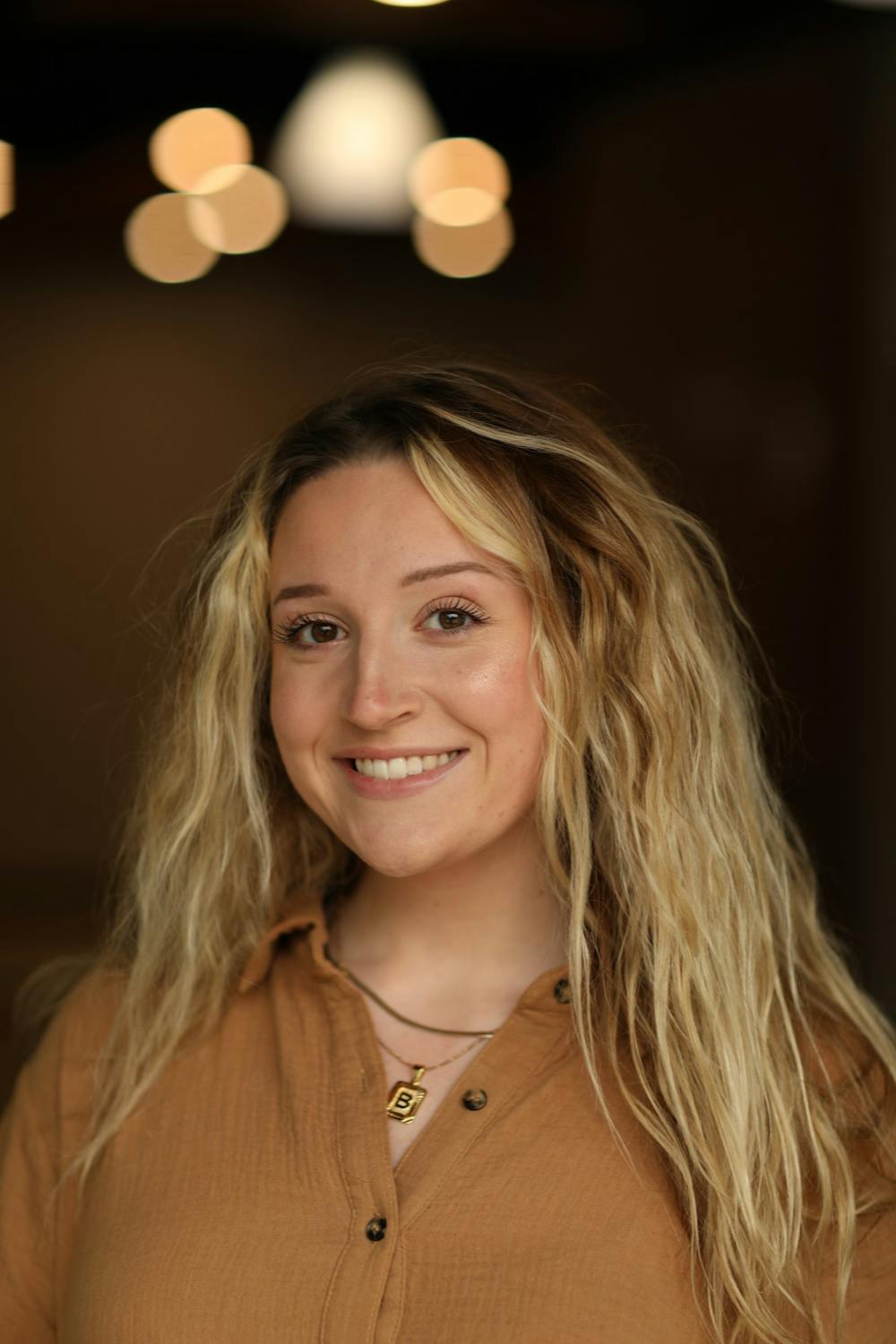
Senior fashion industry studies major Brandi Osthimer poses for a portrait inside the location of the Fashion Merchandising Association's resale pop-up shop. Osthimer is president of the club and often organizes fundraising efforts and events. Rylan Capper, DN
After COVID-19 concerns prevented the club from meeting in person for nearly a year, Osthimer is ready to return to her role as FMA president and bring people together again.
“It's just nice seeing people come together,” Osthimer said. “The bonding aspects of everything and the confidence — I feel like everybody's keying into their strengths through this [club].”
Jessica Wolfe, sophomore fashion merchandising major, is using her social media skills and graphic design knowledge as a member of the FMA promotions committee. Wolfe helps create content for the club’s social media pages, like promotional flyers for upcoming events or organizing Instagram story takeovers and uses what she has learned in her marketing minor to spread the word about the FMA and its events.
“[The FMA has] made me feel like more of a professional, and I feel like I'm learning so much about starting a business, making all the contacts and pushing everything out there,” Wolfe said. “There’s a lot of meetings and scheduling things, and it's made me feel like a bigger part of the club.”
For the past month, Wolfe has been working to spread the news of the FMA’s resale pop-up shop. She built a consistent presence for the FMA on its Instagram account and hung flyers with QR codes linking to the FMA’s Instagram around campus.
“It's really important to get the word out to people and make sure that [people] have access,” Wolfe said. “We've made sure to link to our Instagram so people can immediately get connected to all the information.”
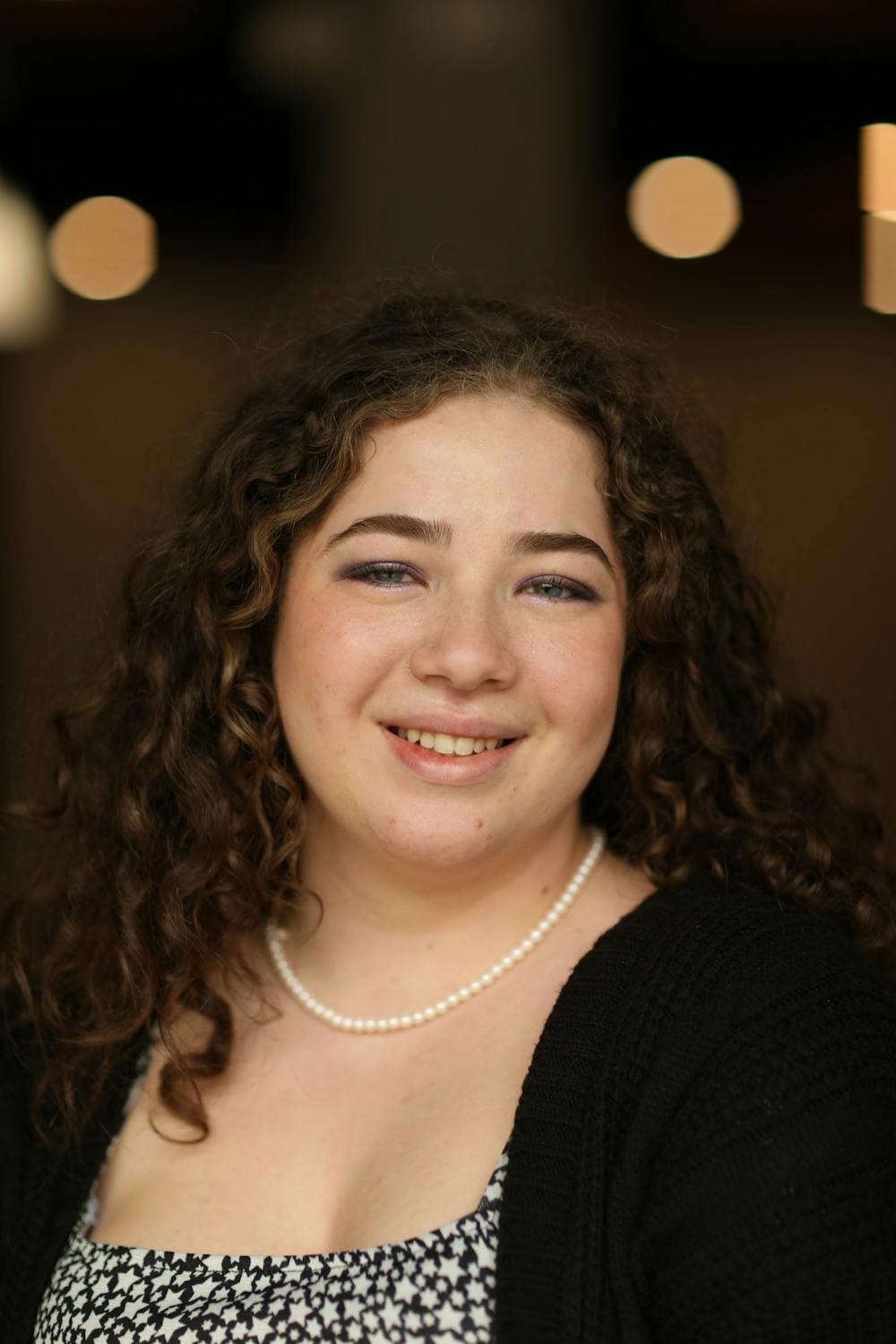
Sophomore fashion merchandising major Jessica Wolfe poses for a headshot inside the location of the Fashion Merchandising Association's resale pop-up shop. The shop will be open Wednesday, Oct. 27 through Friday, Oct. 29 from 2-7 p.m. Rylan Capper, DN
The FMA’s resale pop-up shop fundraiser was put on hold last year due to COVID-19 concerns. Now, as president of the FMA, Osthimer is making sure she keeps up the momentum of the club by holding its resale pop-up shop for the first time since the pandemic began and planning one every semester.
“Our main goal is connecting people with an interest in fashion [and] connecting fashion majors because we are a small major,” Osthimer said. “Being involved in the clubs is a great experience to bond with everybody and network. Our big focus so far this year, though, has been fundraising.”
In previous years, the FMA would hold their resale pop-up shop at a table in the Atrium, which has proved successful, Osthimer said, as the club has raised $200 at their shop before. This year, the FMA decided to rent a building out in the Village, taking their shop to the next level. While the resale pop-up has been successful in year’s past, members of the club are hopeful the shop in the Village will lead to more funds raised and higher foot traffic.
“We had a very wide variety of people that would stop by the table in the Atrium,” Osthimer said, “but we're hoping with this shop to get an even wider array of people. We're going to have more clothes than we've ever had before because we don't have to limit ourselves to a table, and we have a whole space.”
Sophomore fashion industry studies major and the FMA professional development chairman Maureen Kirk started planning the resale pop-up shop a month ago. As committee chair leader of the FMA’s resale pop-up shop team, Kirk has led the efforts of getting everything prepared and organized for the club’s event Oct. 27-29.
In her preparation for the pop-up, Kirk said she has considered the visual merchandising side of fashion, like where to place rails in the store or offering a photo area for customers, which is something she previously hasn’t had the opportunity to work on firsthand.
“We have a garage door that's going to open, so we’ll have a nice big entrance,” Kirk said. “It's really exciting just because we're able to plan out how an actual store would run, so you get more experience with how to set up a store and how to promote it on a bigger scale.”
Gaining more experience in the fashion industry is just one benefit of joining the FMA, Kirk said. As professional development chairman, she has also had the opportunity to update visual merchandising for the Ball State Bookstore.
“I'm the one who does all the painting on [the windows], works with the mannequins to put them in the right places and promotes what clothing will sell best,” Kirk said.
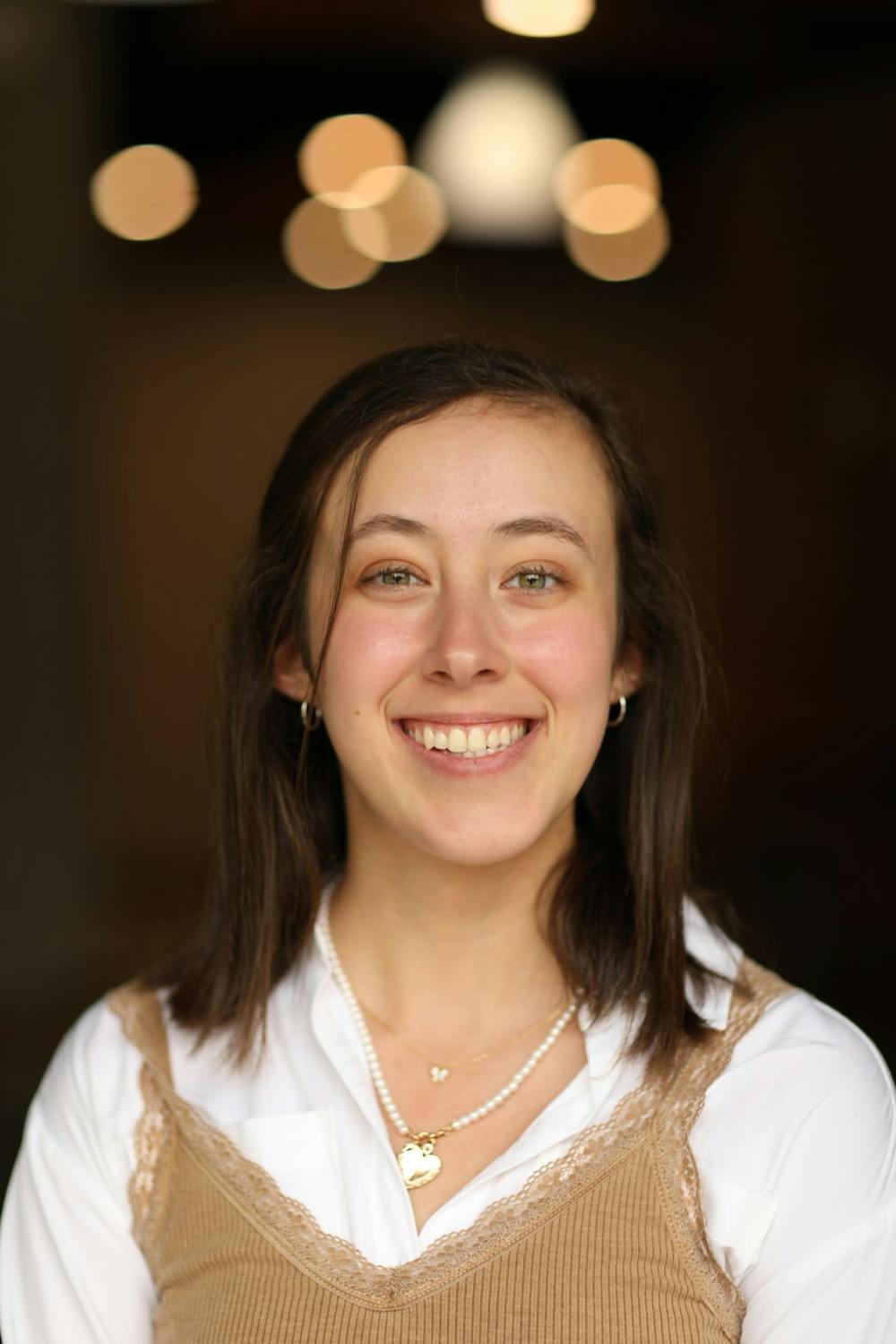
Sophomore fashion merchandising major Maureen Kirk poses for a headshot beneath the lights hanging in the location of the Fashion Merchandising Association's resale pop-up shop. As committee chair leader for the shop, Kirk has delegated responsibilities to the team helping to put the shop together. Rylan Capper, DN
The FMA’s members collected all the clothing being sold at their resale pop-up shop on their own, sifting through their clothing, donating what they no longer wanted and asking friends and family members to pitch in to help raise money for the club. Reselling their own clothes not only helps the club raise funds, but also reduces their overall waste.
ThredUp’s 2021 Fashion Resale Market Report stated 36 billion lbs. of clothing are thrown away in the U.S. each year, 95 percent of which could have been reused or recycled. According to the World Economic Forum, the fashion industry accounts for 10 percent of all humanity’s carbon emissions and is “the second-largest consumer of the world’s water supply,” producing mass amounts of waste and pollution that can be reduced through reselling. ThredUp reports an item bought used versus new displaces 17.4 lbs. of CO2 emissions, and a resale pop-up shop is one way FMA can do its part.
While helping the environment is one benefit for FMA, all proceeds made at the resale pop-up shop will go toward helping FMA members afford opportunities like field trips to New York City for the National Retail Federation Convention, which allows more opportunities for members to network.
A year before the pandemic, the FMA sent their first group to New York City for the National Retail Federation Convention where businesses like Kohl’s, Walmart and Gap come together and help fashion-focused individuals network and meet with different CEOs of fashion companies.
“You also have the opportunity to interview these companies and possibly get a job or an internship,” Osthimer said. “You literally sit at a round table with all of these big names in the fashion industry and the companies, and it's a great opportunity overall to learn more about it. If we can raise more money, more people will be able to go on the New York trip.”
Those trips are important to members of the FMA, Osthimer said, because they help in figuring out networking opportunities for students while aiding in the development of professionalism skills for the fashion industry.
Closer to home, the club promotes professionalism and networking by hosting guest speakers, sharing internship opportunities and meeting with other student members who have more experience.
“I've thought of doing resume and LinkedIn workshops, just because — since we are in the fashion major — it's a little different,” Osthimer said. “We don't have to be as strict when we are making our resumes or creating our LinkedIn profile.”
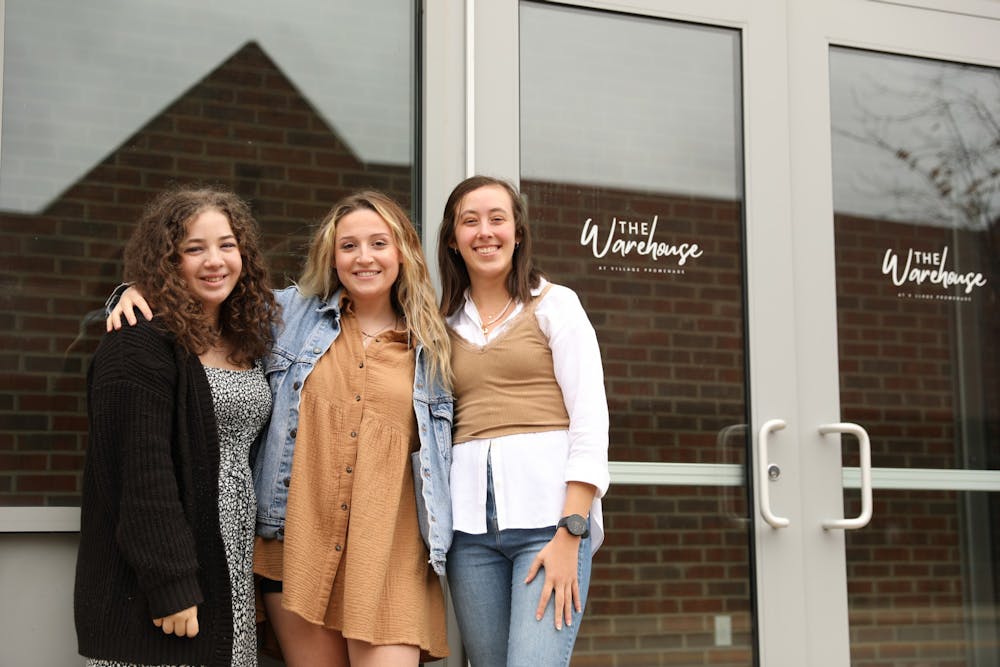
Jessica Wolfe (left), Brandi Osthimer (middle) and Maureen Kirk (right) pose in front of the location of the Fashion Merchandising Association's resale pop-up shop. The team started planning more than a month before the event. Rylan Capper, DN
While building her portfolio has been a plus for Wolfe, she said, her biggest takeaway from joining the FMA have been the connections she has made, especially with people like Osthimer and Kirk. Wolfe said the FMA is a safe place where she feels she is heard, and before joining the club, she hadn’t experienced being somewhere her ideas mattered.
“This is the first club I've been in [on campus], and I'll suggest something like how to reach out for donations, and the other members have always supported me,” Wolfe said. “They always say, ‘Let's try it.’ The least we can do is try, and they always support that.”
Osthimer said members of the FMA “love new ideas” and they all try to help one another in being successful in the fashion industry. Because every member joins the club with little to no knowledge regarding what it takes to make it in fashion, Osthimer said it’s important to support one another and learn together as a team.
“We're all working together — teamwork makes the dream work,” Osthimer said. “That's such a generic thing to say, but it’s really true. If somebody is not pulling their weight in the group, it's hard to get back up.”
Not only has the FMA helped members find friendships, but Osthimer has also found more faith in herself and her work. Before taking over as FMA president, Osthimer had never held a leadership role before, but she feels she has found her voice through the role.
“I feel like I've really been able to key into my personal confidence,” Osthimer said. “Being able to work with other people and forming those team-building skills just reminds me that I’m a part of something more than myself.”
Contact Taylor Smith with comments at tnsmith6@bsu.edu or on Twitter @taywrites.

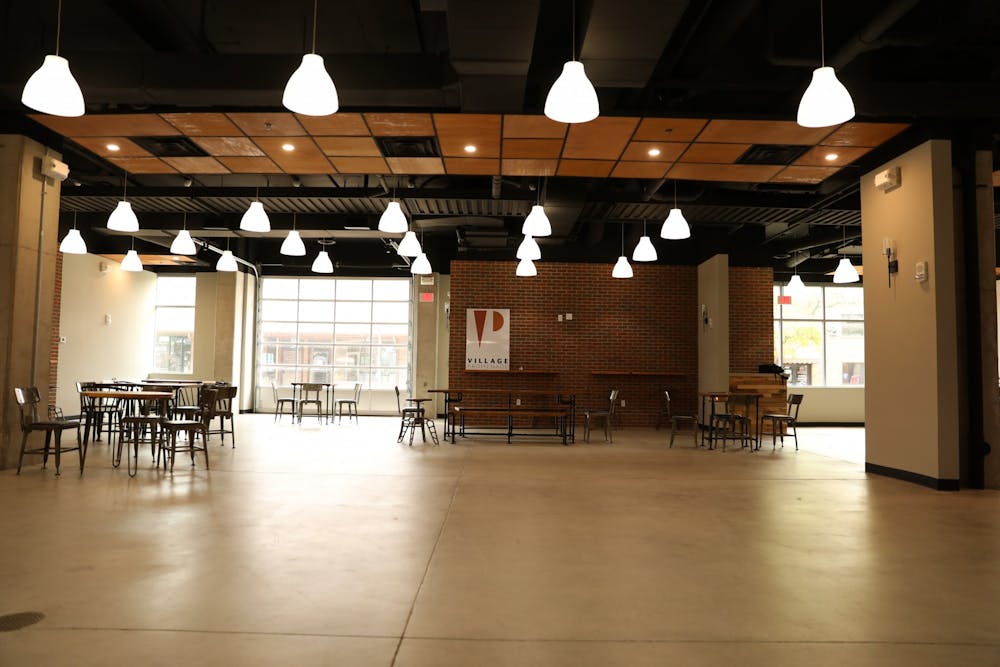


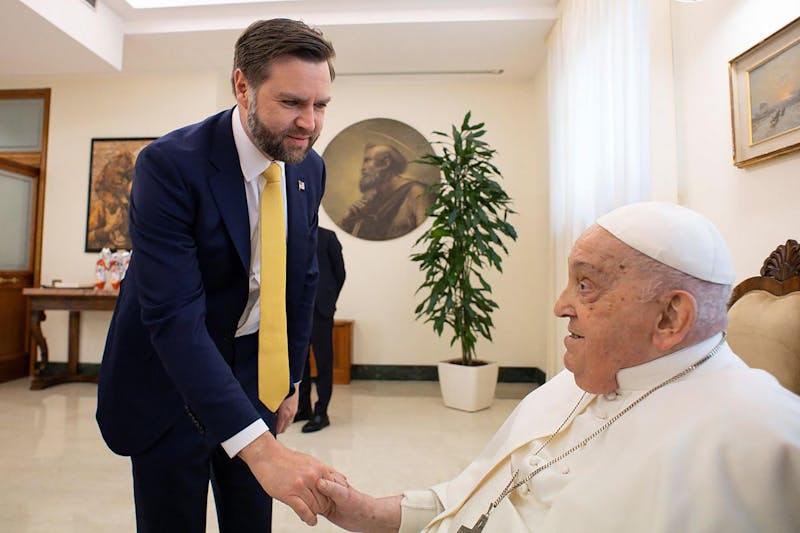
The Daily News welcomes thoughtful discussion on all of our stories, but please keep comments civil and on-topic. Read our full guidelines here.